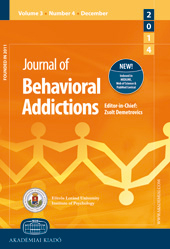Facebook Role Play Addiction – A Comorbidity with Multiple Compulsive–Impulsive Spectrum Disorders
Facebook Role Play Addiction – A Comorbidity with Multiple Compulsive–Impulsive Spectrum Disorders
Author(s): Deepa Nathan, Lekhansh Shukla, Arun Kandasamy, Vivek BenegalSubject(s): Cognitive Psychology, Behaviorism, Psychoanalysis, Substance abuse and addiction, Social Informatics
Published by: Akadémiai Kiadó
Keywords: Facebook addiction; role playing; social networking site addiction; Internet addiction; Facebook role play;
Summary/Abstract: Problematic Internet use (PIU) is an emerging entity with varied contents. Behavioral addictions have high comorbidity of attention deficit hyperactivity disorder and obsessive–compulsive spectrum disorders. Social networking site (SNS) addiction and role playing game (RPG) addiction are traditionally studied as separate entities. We present a case with excessive Internet use, with a particular focus on phenomenology and psychiatric comorbidities. Case presentation: Fifteen-year-old girl with childhood onset attention deficit disorder, obsessive– compulsive disorder, adolescent onset trichotillomania, and disturbed family environment presented with excessive Facebook use. Main online activity was creating profiles in names of mainstream fictional characters and assuming their identity (background, linguistic attributes, etc.). This was a group activity with significant socialization in the virtual world. Craving, salience, withdrawal, mood modification, and conflict were clearly elucidated and significant social and occupational dysfunction was evident. Discussion: This case highlights various vulnerability and sociofamilial factors contributing to behavioral addiction. It also highlights the presence of untreated comorbidities in such cases. The difference from contemporary RPGs and uniqueness of role playing on SNS is discussed. SNS role playing as a separate genre of PIU and its potential to reach epidemic proportions are discussed. Conclusions: Individuals with temperamental vulnerability are likely to develop behavioral addictions. Identification and management of comorbid conditions are important. The content of PIU continues to evolve and needs further study.
Journal: Journal of Behavioral Addictions
- Issue Year: 5/2016
- Issue No: 2
- Page Range: 373-377
- Page Count: 5
- Language: English

